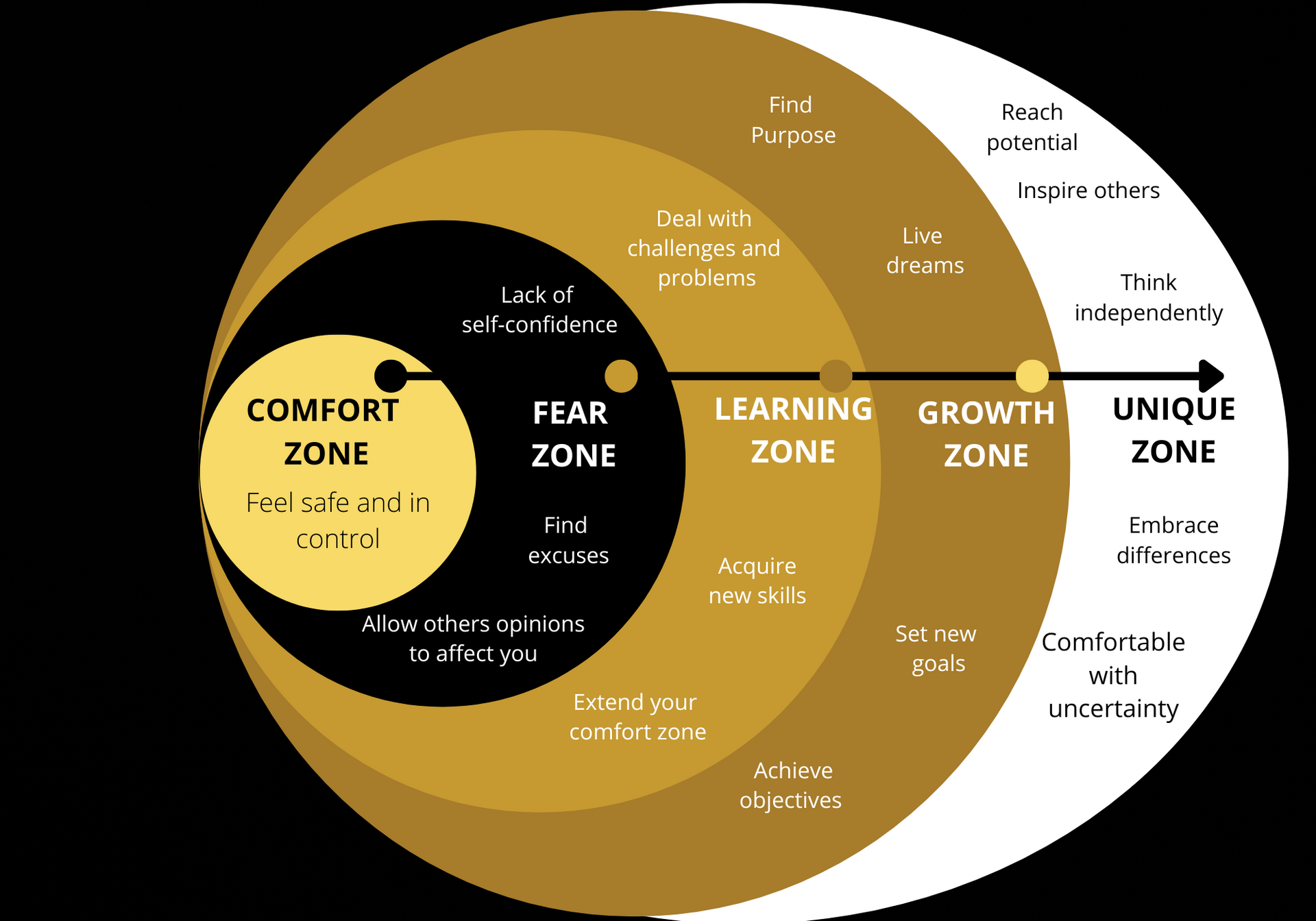Embracing Difficult Conversations and Uncertainty
Do you avoid conversations because you think they might be tough?

I know I used to, that is, until I had a good chat with myself, outlined my plan, and decided to help someone else.
"The way we see the problem is the problem." Stephen R. Covey
The issue is that avoiding them doesn’t make them disappear or resolve the problem that led to the need for what could be a challenging conversation. As Stephen R. Covey says, "the way we see the problem is the problem."
What is in the way is the way because what we avoid gets bigger in our minds, and we then assign meanings to situations that may not be real or truthful. We are meaning-making machines, and our incredible minds can create all sorts of stories and scenarios about how situations might turn out.
Some conversations can be difficult, but that doesn’t make them impossible, they may just be uncomfortable. 'I’m possible' offers a different perspective on the word 'impossible' because when something is important, it is possible. It's all about finding the way. Having conversations that might be tough is a part of life, and it is equally crucial in business.
The Comfort Zone
It is human nature to seek comfort, so for many of us, avoiding situations that cause discomfort is a natural response. When we find ourselves in an environment where we feel at ease, it feels safe and secure. In most cases, we might also feel relaxed and believe we are in control. However, ask yourself, in control of what?
The reality is that when we try to control everything around us, we miss out on opportunities that could otherwise come our way. Avoiding opportunities, difficult situations, or saying no to yourself is a form of control that holds you back from becoming who you are meant to be.
You may feel safe and secure in your comfort zone. However, you will not learn and grow there. So, when you decide not to have that difficult conversation and keep yourself safe and comfortable, who are you hurting?
The Fear Zone
The truth is that when we stretch our comfort zone and leap into the fear zone of confronting what is uncomfortable, we often find that what we feared or avoided isn't as daunting as we thought it would be.
The fear zone is where we lack self-confidence, make excuses, procrastinate, worry about other people’s opinions, and generally feel uneasy. Think about it: how important are other people's opinions anyway? They are just opinions, which are like belly buttons, everyone has one. It is more important to ask yourself great questions and care about your own opinion of yourself.
When you can confront whatever that fear may be, you will most likely discover that you are more than capable of doing the thing you were afraid of. It might take a few attempts to get good at it, but doesn’t everything require practice when we’re learning a new skill?
As long as you don't explode or burst into flames, you'll survive the challenge, learn from it, and develop new beliefs about what's possible, while often helping another person to improve as well. So, when you confront that fear of having difficult conversations, you expand your comfort zone further and move into your learning zone.
“A person's success in life can usually be measured by the number of uncomfortable conversations he or she is willing to have.”
Tim Ferris
The Learning Zone
Your learning zone is where you have stretched yourself to move beyond your comfort zone, embraced the opportunity and gained knowledge of how you can approach difficult conversations. You are getting out of your way, because what is in the way is the way. Are you in the way of your learning and growth?
When you put knowledge into practice and embrace learning how to have difficult conversations, you will realise you have grown as a leader. The wonderful thing is that this learning benefits not only you in business, but also life.
Just as important is that by learning how to have difficult conversations, you can help others and create a supportive and inclusive environment, one that is ecological. Good for you, good for the other person and good for the greater good.
This growth stems from how you think and embrace being comfortable with discomfort. Welcome uncertainty by learning to have difficult conversations, and your comfort zone will stretch to include the growth zone.
The Growth Zone
This constant stretching of your comfort zone is about embracing being comfortable with feeling uncomfortable. When you do this, new growth opportunities emerge because you have created chances to learn.
The situations that made you feel uneasy, in this case, difficult conversations, have started to dissipate. It has become less of a challenge as you have embraced the chance to learn. The key throughout all zones of growth is to trust yourself, learn how to learn, ask great questions, and be willing to seek help.
The growth zone is where the real magic happens, and you realise that you are more capable than you gave yourself credit for. When you understand your behavioural style and what you are good at and not good at, you can seek out the knowledge to learn how to maximise your strengths and use them to help others.
Learning how to communicate effectively and have difficult conversations requires being able to listen. Just listen to understand without judging or imposing your map of the world onto what someone else is saying. This is the essence of difficult conversations and personal growth.

It’s that simple!
Yes, I know you’re probably thinking, "but it’s not simple," and I get that. When I was a young leader, I also avoided difficult conversations, and all it did was cause me more angst and stress, as I created more work for myself while the other person or people didn’t learn.
When I embraced learning how to have conversations that could be challenging, I discovered that the key is not to make them personal. Subjectivity can hinder effective conversations, so objectivity is crucial in handling difficult conversations.
Like any skill we want to acquire, it starts with being aware of the need or desire to learn. As humans, we can learn anything we put our minds to, but we must want to do it.
Having difficult conversations is a valuable skill to learn, whether in life, relationships, or business. When you do, there exists the ability to help others be the best they can be, and isn't this what being a leader is all about?
Here are a few tips for approaching difficult conversations.
#1. Listen to understand.
- Focus on the conversation being about the other person, not about you.
- Put aside your doubts and uncertainties to focus on listening to what the other person has to say.
- Give them a safe space to share their thoughts, feelings and experiences of what is contributing to the need for the conversation to take place.
- Listen with patience, empathy and humility.
- Avoid the temptation to interrupt, defend or judge.
- Every human being has a unique map of their world and situations. Be present and allow them to share their perspective (their map) of the problem so that you can understand before trying to express your view.
Being willing to listen and facing difficulty is a reflection of your character and, therefore, relates to trust. Trust in yourself to have the conversation and build trust with the other person.
#2. Respond with intent and integrity.
- Responding with intent is about your motive for the conversation and being transparent about your agenda and what you aim to achieve.
- When you understand the other person's perspective on the situation, share your views with clarity and confidence, even if you’re feeling unsure.
- Behave like the leader you aspire to be, and you will become that person, whether as a leader in business, family, or relationships.
- Prepare your notes beforehand, ensuring you are clear on your perspective and willing to be honest, authentic, and fair.
This is how you can embrace uncertainty and present your map of the situation, your view of how it currently is or how you think it needs to be. Embracing the uncertainty of not knowing where the conversation will lead is the pathway to finding a solution.
#3. Aim for a win/win outcome.
- There is always a need to be flexible in your thinking, bringing humility to the conversation that demonstrates your understanding of the situation.
- If you are rigid in your viewpoint and not open to other perspectives, you will find it challenging to have effective conversations, whether difficult or otherwise.
- Being flexible does not mean you have to agree with everything. It is about discussing with each other, clarifying, and exploring options to find an outcome that benefits everyone.
- If the other person is rigid, that is on them. However, if you are inflexible, that is on you. In all situations, we only have control over ourselves, not others.
Everything is a choice, and as the one leading the conversation, you can aim for a win/win. The goal is to engage in the discussion and move forward with a solution that works for everyone. Doing this in a way that aligns with your character as a leader is the right approach!
To Sum Up
Practice these tips in any conversations you are having, not just the difficult ones. We have two ears and one mouth, and only one of them can shut. When you can listen to understand and respond with genuine intent, you can achieve an excellent outcome for all involved. Give it a try, you’ll be amazed at the difference.
The zones we navigate when embracing uncertainty to challenge ourselves and learn something new resemble a revolving door. Each time a new challenge arises, urging us to stay in our comfort zone, remember that the fear zone is the first hurdle, and proceed from there.
Work through the zones to learn, grow, and reach the ultimate zone. The Unique Zone is the ultimate destination. Be unique and excel in what you do. Everyone has the potential to achieve this.
If you would like to learn more, book a 45 minute Complimentary Strategy Session with a lead coach at Leaders Network.





